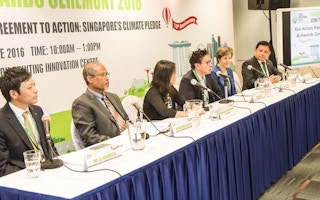Singapore is developing support programmes, legislative frameworks and tools to act on the climate pledge it made under the recently-signed Paris Agreement in December, said the country’s Minister for the Environment and Water Resources Masagos Zulkifli last Friday.
To continue reading, subscribe to Eco‑Business.
There's something for everyone. We offer a range of subscription plans.
- Access our stories and receive our Insights Weekly newsletter with the free EB Member plan.
- Unlock unlimited access to our content and archive with EB Circle.
- Publish your content with EB Premium.
Even though Singapore has “very low emissions” - contributing about 0.11 per cent of the world’s total emissions - it is “serious about it because we are one of the most vulnerable countries subjected to climate change,” the minister told a packed-room of over 100 business executives at the Eco Action Day Dialogue held on June 3.
The discussion, themed “From agreement to action: Singapore’s climate pledge”, also marked the 10th anniversary of the Eco Action Day initiative led by Japanese multinational Ricoh Asia Pacific.
It calls on organisations and individuals to pledge actions for the environment in the lead up to World Environment Day on June 5 every year.
Masagos singled out three key areas - energy efficiency, solar energy and green procurement - to demonstrate what the government is doing to tackle emissions.
The country has broad frameworks in place, including the Energy Conservation Act, which mandates energy intensive companies to register with the National Environment Agency (NEA) and implement energy efficiency and management practices. It also offers financial assistance schemes, such as the Energy Efficiency National Partnership Programme by the NEA, to help defray the cost of equipment upgrades.
While Singapore aims to raise its efficiency, it is also slashing its emissions by increasing its use of solar energy. It has a target to grow solar capacity from around 57 megawatt peak in 2015 to 350 megawatt peak by 2020 so that solar and renewable energy will make up to 8 per cent of the country’s energy supply by 2030.
The government will also be “taking the lead” by adopting green procurement programmes that only buy sustainable, efficient products, said Masagos. For instance, from the third quarter of 2016, it will only procure printing paper that carries the Singapore Green Label and electrical products that have been certified to have high-energy efficiency.
“The government’s role is to balance Singapore’s international role and domestic objectives in ensuring environmental sustainability, economic competitiveness and energy security,” he said.
But “it is also important for everyone to play their part in reducing their carbon footprint, instead of relying on the government completely”, he added.
The private sector’s role
Also speaking on the panel, Unilever vice president for communications and sustainability, David Kiu, explained how businesses can play a key role in helping the world achieve its climate targets.
Unilever’s sustainable living plan is the “blueprint” for the company’s business growth. It outlines sustainability strategies to help the company reach its target of doubling revenue while at the same time halving their environmental impact.
Kiu shared that thanks to the plan, the company has reached a few milestones in the past five years, including a reduction of its carbon footprint by 40 per cent and achieving zero waste to landfill at 600 sites in 2015.
There are not only risks and challenges, but also opportunities from climate change for business growth, said Kiu. “Sustainability is fundamental to how our business will succeed, it is core to the business strategy and future” he added.
“
It is also important for everyone to play their part in reducing their carbon footprint, instead of relying on the government completely.
Masagos Zulkifli, Minister for the Environment and Water Resources, Singapore
J.D. Kasamoto, Ricoh Asia Pacific’s general manager of its service and environment division, highlighted that Ricoh has set targets for energy and resource conservation within a specific timeline to drive sustainability.
The company adopts an approach called PDCA, or “plan, do, check, action”’ that provides a useful way to track developments and targets, said Kasamoto.
Giving the academic perspective, Ann Florini, Singapore Management University’s Professor of Public Policy, emphasised the need for multiple stakeholders “having regular conversations” on sustainability.
She highlighted that although the government has largely led the efforts for environmental sustainability, everyone has a responsibility. For example, the academic community can play a part in providing training and education to have open and honest conversations about climate change and the broader system; whilst the media has the responsibility to convey the effects of climate change, the impact on people and how people are responding to the changes.
Sandeep Chamling Rai from WWF international agreed, and mentioned that with climate commitments till 2020, everyone has to play a part in achieving the targets.
At the event, Minister Masagos also handed out the Eco Action Awards, organised by Ricoh, which are designed to recognise organisations (corporate, schools, institutions, associations) for their commendable efforts towards making a difference for the environment.
Some of the winners this year were CHIJ Our Lady Queen of Peace, Systems on Silicon Manufacturing Company and Nanyang Technological University.
To date, 629 organisations, schools and individuals have pledged positive actions for the environment in Singapore under the Eco Action Day campaign. Tetsuya Takano, Ricoh Asia Pacific managing director, the initiative “serves as an opportune time to be reminded that we, as individuals, can take actions to reduce the environmental impact in our daily lives.”








